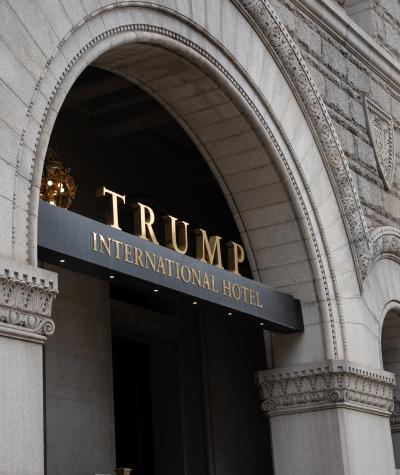When President-elect Trump first assumed office in 2017, he publicly vowed not to let his millions of dollars of personal interest conflict with his duties as president.
He appeared to genuinely follow through with this pledge, handing over control of his real estate company to his sons and selling off his stock shares prior to beginning his 2016 campaign.
His virtuous approach to balancing the titles of millionaire and president did not last long — Trump racked up over 3,400 conflicts of interest during his first term.
From local government all the way to the highest ranks of public office, preventing conflicts of interest is a core part of how we ensure elected officials are always prioritizing the public interest over personal gain.
Violating this fundamental ethics pledge often paves the way for corruption, the misuse of taxpayer funds, and decision making that benefits an individual over the American people.
Just as we do for all administrations, Campaign Legal Center will be carefully tracking conflicts of interest and calling out instances of ethics violations throughout the transition and into the second Trump presidency.
The American people deserve transparency and an honest depiction of what — and who — their leaders are working for.
The Legacy of Trump’s First Term
During his prior term, Trump thoroughly rejected any attempts to separate his business from his office and retained his power of official decision making over his real estate empire. His involvement led to several potential ethics violations.
- Using his official role to promote his private businesses. Trump hosted several official events at his properties and would often elevate them during official remarks — such as when he previewed that the 2020 G-7 summit would be held at his golf resort in Miami, boasting the property’s “magnificent buildings” and “incredible conference rooms.” He also had the U.S. ambassador to the United Kingdom ask the British government to hold the British Open at his golf resort in Scotland.
- Hosting foreign officials at his Washington, D.C. hotel. Government officials spanning six foreign countries collectively spent over $750,000 at the Trump International Hotel during his presidency, doing so “at sensitive times for those countries’ relations with the United States.” The egregious spending raised concerns that Trump was violating ethics laws designed to prevent corruption and foreign influence on federal officers.
- Pushing through trademarks for his businesses. Trump and his family members won several trademarks for their businesses during his presidency, including multiple from the Chinese government while the U.S. was engaged in a large trade war with the state.
Possible New Conflicts of Interest for Trump’s Second Term
While Trump’s business holdings are well- known conflicts of interest, several allies Trump has gained since leaving office represent outside interests that now stand to benefit from his second stint in the White House.
- A growing relationship with tech industry giants. Some of the biggest tech moguls began courting and building rapport with Trump and may have an expectation that his transactional approach to politics could yield boons to the industry. Trump has already given a leadership position to billionaire technocrat Elon Musk, who may now have the ability to advise on regulations that benefit his businesses.
- New businesses and opportunities to gain Trump’s favor. Trump owns a majority stake in the social media platform Truth Social, which he turned into a publicly traded company with stock available for purchase by anyone — including foreign interests. The platform presents a clear pathway for any deep-pocketed interests looking to be on Trump’s good side. His business interests may also include cryptocurrency, an industry he has indicated he will support during his second term.
- A greater presence abroad. Since Trump left office, his family has gone into business with several foreign governments that he would be expected to manage relationships with as a second term. Now, Trump is not just in business with foreign companies, but government entities themselves.
On top of these new and old conflicts, it is concerning that Trump has not bothered to repeat any of his first term promises to hold himself to a high ethical standard and keep his business and official role separate.
He has yet to sign an ethics pledge of any sort or publicly state what his relationship to his businesses will be for the next four years.
Moreover, his cabinet selections and political nominations are filled with plenty of magnates like himself — deep-pocketed business leaders with limited government experience and a slew of conflicts of interest.
Once the administration begins, CLC will continue to monitor and bring transparency to potential conflicts of interest and any ensuing violations of ethical conduct. The American people deserve full transparency on the personal interests of their public officials.

